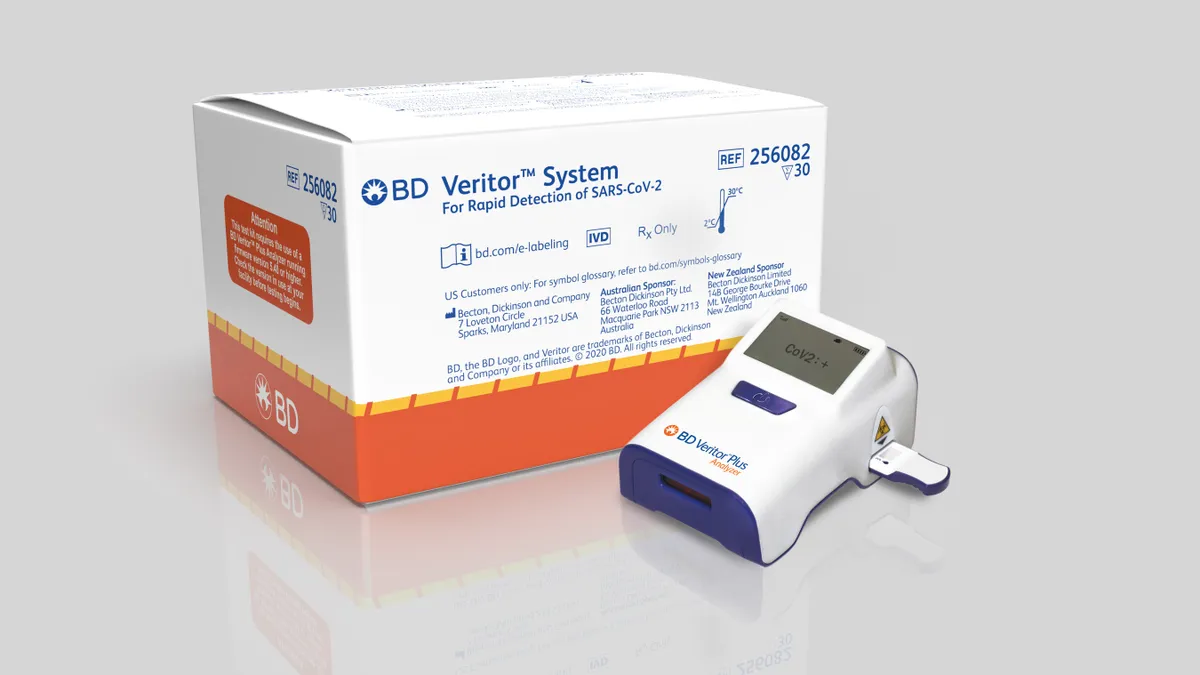Dive Brief:
- BD on Thursday reported a 11.4% year-over-year decline in revenues to approximately $3.86 billion during its fiscal third quarter, below the average analyst estimate of around $3.96 billion. While the company experienced strong demand for coronavirus diagnostics, the medtech saw "significant pressure" on its surgery portfolio as a result of elective procedure deferrals.
- CEO Tom Polen told investors that COVID-19 had a "net negative top line impact" of $600 million in the third quarter, emphasizing the business environment remains challenging. Polen did say the company saw "encouraging trends" in the procedure volumes in June and July as it entered the fourth quarter.
- A key bright spot for BD is the recent launch of its COVID-19 rapid point-of-care antigen test which received an emergency use authorization from the FDA in early July, making it only the second such diagnostic. SVB Leerink analysts wrote on Thursday that BD's capacity for producing the antigen test may add up to $1.5 billion in revenue during fiscal year 2021.
Dive Insight:
Among BD's hardest-hit units in the third quarter was the company's Interventional segment, driven by the surgery and peripheral intervention businesses, with revenue dropping 20.3% from the prior-year period due to elective procedure deferrals.
While Polen told investors BD saw sequential improvement each month in demand for elective procedures as the quarter progressed, it remained below pre-coronavirus levels. "We exited Q3 seeing [BD Interventional] procedure volumes at approximately 80% of pre-COVID levels," he said.
Nonetheless, these COVID-19 headwinds appear to be diminishing as hospitals have started to resume elective and non-urgent procedures. Polen highlighted that China in June reported year-on-year growth in all BD Interventional businesses and it continues to watch the country closely "since they are further along in their post-COVID restart."
In the U.S., BD's third-quarter revenues dropped 13.1% from the prior-year period, with the silver lining coming from revenue growth in the Diagnostic Systems unit due to COVID-19 testing. For the rest of the world, the revenue fell 9.2% from the prior-year period, with declines in China and Latin America partially offset by growth in Europe and EMA.
On the coronavirus testing front, Polen said BD is currently producing 1 million molecular diagnostics test a month for use on the company's BD Max System.
While SVB Leerink analysts believe polymerase chain reaction (PCR) tests will continue to be the "gold standard" for COVID-19 tests, they wrote on Thursday that antigen testing "could offer the opportunity to help 'bridge the gap between the significant bolus of incoming demand and current RT-PCR capacity."
In the month since the launch of BD's antigen test, Polen said the company has shipped more Veritor readers than it normally does in an entire year.
The Department of Health and Human Services announced last month that it was purchasing 750,000 of BD's antigen test kits and 2,000 of its Veritor Plus systems that the tests run on. In addition, BD late last month was awarded $24 million by HHS and the Department of Defense to scale up production of its antigen test.
And, just this week, seven states formed a buying consortium with plans to purchase a total of 3.5 million antigen tests from both BD and Quidel. However, William Blair analysts said the orders from the multistate agreement "alone represent nearly a quarter of the monthly capacity" for both companies combined and "as more states are likely to be added to the consortium, those too will add to a demand on a capacity that already was stretched beyond its limits."
Nonetheless, Polen said on Thursday's call that BD is working to increase supply capacity and feels confident about its original goal of producing a total of 10 million antigen tests in the fourth quarter and an 8 million test-per- month run rate by the end of the fiscal year. He noted that a $24 million investment from DOD and HHS in to scale up BD's manufacturing will likely translate to 12 million Veritor assays being produced monthly by the end of next February.













